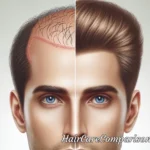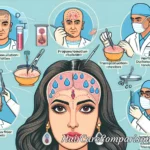Undergoing a hair transplant can be a transformative experience for many, offering not just a new look but also a renewed sense of confidence. However, the post-operative period requires careful management to ensure the best possible outcomes. Among the many considerations, understanding how and when to safely resume sexual activity is crucial for both healing and overall well-being. This article explores the nuances of sexual activity post-hair transplant, offering guidance to navigate this aspect of the recovery phase.
Understanding the Healing Process
Post-hair transplant care is integral to achieving the desired aesthetic results. The scalp needs time to heal properly, which means patients must adjust their lifestyle temporarily to accommodate this healing period. This includes avoiding certain activities that could jeopardize the success of the transplant or lead to complications.
When to Resume Sexual Activity
The question of when to resume sexual activity post-hair transplant is common among patients. The answer largely depends on the individual’s healing process but generally, healthcare professionals recommend waiting at least a week before engaging in any sexual activity. This precaution helps prevent sweating and increased blood pressure, which can both negatively impact the healing grafts. For more detailed insights, consider exploring the guidelines on avoidance of sexual activity post-transplant.
The Impact of Sweating
Why It Matters
Sweating can be particularly problematic in the early stages of hair transplant recovery. It not only risks infection to the healing scalp but can also dislodge the newly transplanted hair follicles. Maintaining a cool and dry environment for your scalp is paramount during this time.
How to Manage
Managing sweat effects post-hair transplant involves taking it easy, avoiding intense physical exercise, and staying in cooler environments. It’s also beneficial to wear loose, breathable hats if you need to venture outdoors during hot days.
Other Lifestyle Considerations
Smoking and Its Risks
Smoking post-hair transplant can significantly hinder the healing process and the overall success of your hair grafts. Nicotine constricts blood vessels, impairing blood flow to the scalp and thus, the necessary oxygen and nutrients needed for healing. For those considering quitting smoking for their hair transplant, more information can be found on the risks of smoking post-hair transplant.
Sleeping Positions
Adopting proper sleeping positions post-hair transplant is another critical aspect of the recovery process. Sleeping upright or on your back can help minimize swelling and prevent accidental tugging or rubbing of the transplanted area.
Dietary Adjustments
Maintaining a healthy diet post-hair transplant is not just good for your overall health but can also aid in quicker and more effective healing. A diet rich in vitamins, minerals, and proteins supports hair growth and strengthens the newly transplanted follicles.
Communicating with Your Partner

Open communication with your partner about the limitations and necessary precautions post-transplant is crucial. Discussing your needs and concerns can help manage expectations and ensure that both you and your partner are on the same page regarding intimacy during your recovery period.
Monitoring Your Progress
Keeping a close eye on your recovery and any changes to your scalp is important. If you notice any unusual symptoms, such as excessive swelling, pain, or signs of infection, it’s essential to contact your healthcare provider immediately. Regular follow-ups with your surgeon can also help monitor your healing and ensure that your recovery is on track.
Emotional and Psychological Considerations
The recovery phase post-hair transplant is not just a physical process but an emotional one too. The temporary limitations on activities, including sexual activity, can be frustrating for some. It’s important to stay positive and remind yourself that these restrictions are temporary and for the benefit of your long-term appearance and health.
Long-term Care for Your Transplanted Hair
Once the initial healing phase is over, establishing a routine for the long-term care of your transplanted hair will help maintain its health and appearance. This includes regular washing with gentle shampoos, careful styling to avoid stress on the follicles, and ongoing protection from excessive sun exposure.
Conclusion
Resuming sexual activity post-hair transplant requires patience, understanding, and adherence to your surgeon’s guidance. By taking the necessary precautions and allowing your body the time it needs to heal, you can enjoy not only a successful recovery but also the full benefits of your hair transplant. Remember, every patient’s journey is unique, so it’s important to follow the advice tailored to your specific situation and needs.






